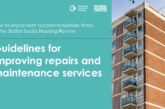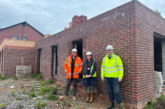New analysis from the Chartered Institute of Housing (CIH) reveals that more than 165,000 homes for social rent have been lost in just six years.
The CIH is predicting that loss will reach 199,000 by 2020 — making it increasingly difficult for people on lower incomes to access a decent home at a price they can afford.
Funding for social rent, which tends to be around 30-40% cheaper than market rent, was cut by the coalition government in 2010. Since then, funding has been targeted towards homes for ‘affordable rent’, which can be up to 80% of market rents.
But CIH said its projection of future losses is lower than in previous years because the Government has made several positive announcements in recent months, including more funding for housing associations, lifting the Housing Revenue Account borrowing cap for local authorities and abandoning plans to force councils to sell their most valuable empty homes.
Figures from the Ministry of Housing, Communities and Local Government and Homes England show that 117,828 local authority homes and 47,869 housing association homes for social rent were lost between 2012 and 2018. Despite some continued new-build for social rent, numbers have continued to fall — because of right to buy sales and properties being converted to ‘affordable rent’ or demolished.
Based on current trends, CIH is projecting that 199,000 homes for social rent will have been lost between 2012 and 2020 — 140,828 council homes and 57,869 housing association homes. Those figures include the loss of an estimated 3,000 homes due to the West Midlands pilot of the extension of right to buy to housing associations.
Chief Executive Terrie Alafat CBE said: “For many people on lower incomes, the only truly affordable option is social rent. It is simply unacceptable that we are losing so many of our most affordable homes at a time when more and more people are in need.
“We need to increase the number of homes we are building but it’s not just a numbers game — we need to make sure we are building the right homes, in the right places, at the right prices.”
Terrie added: “We have seen some welcome progress in recent months, including the removal of the Housing Revenue Account borrowing cap to help councils build more homes and the new investment partnerships between housing associations and Homes England.
“But government investment is still heavily skewed towards the private market. Our analysis shows that 79% of the housing budget up to 2020/21 is directed towards private housing, with just 21% going to affordable housing. Rebalancing this budget could make a big difference — it is vital that the Government supports councils and housing associations to build more homes for social rent.”
CIH is also calling on the Government to suspend the Right to Buy, which is the biggest factor in the continued fall in homes for social rent.
Terrie commented: “Not only are we failing to build enough homes for social rent — Right to Buy means we are losing them at a time when millions of people need genuinely affordable housing more than ever.
“We support the principle of helping tenants move into home ownership if that’s what they want, but it cannot be at the expense of other people in need. The Government should suspend Right to Buy to stem the loss of social rented homes, remove the barriers stopping councils from replacing homes sold and look at more effective ways to help people access home ownership.”
Responding to the analysis, Cllr Martin Tett, Housing spokesman at the Local Government Association, said: “These figures show that our national housing shortage remains one of the most pressing issues we face. The last time the country built more than 250,000 homes in a year, in the 1970s, councils built around 40% of them.
“By recently lifting the cap on councils being able to borrow to invest in new and existing housing, the Government showed it had heard our argument that councils must be part of the solution to our chronic housing shortage and able to resume their historic role as a major builder of affordable homes. Councils now need to be able to keep 100% of Right to Buy receipts and set discounts locally to ensure they can replace any homes sold.
“A genuine renaissance in council housebuilding is the only way to boost housing supply, help families struggling to meet housing costs, provide homes to rent, reduce homelessness and tackle the housing waiting lists many councils have.”









